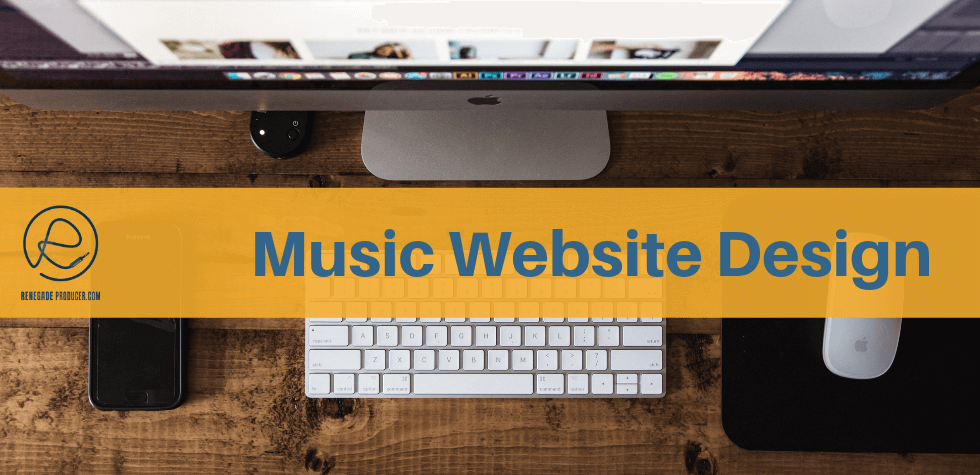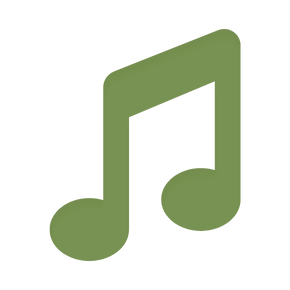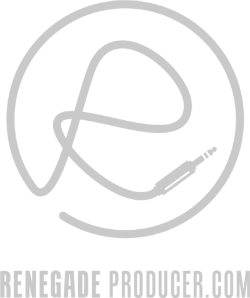25-step music production process checklist and video workshop >>>
Producer, Band & Musician Website Design Tips

The page below contains band & musician website design tips for independent music artists and bands who are new to the world of website design.
First things first...
Know Yourself: Know why you
want a website and what you want it to do. This makes it easier to
research, plan and select the right tools to get the website you want.
Know Your Visitor:
What are the people you wish to attract to your website all about? What
do they like? What types of music are they into? What are their
beliefs? Where do they like to hang out? What are their concerns?
Your main aim with your music website design is always to create an experience which connects and resonates with your audience and for this you have to know what would appeal to them. Once you are clear on the above you can get into the actual website planning...
The Basics of Great Band & Musician Website Design
Your site needs to please three main parties...
1.
Your Visitors: Your visitors are the most important
party to please because they are after all the people you want to
connect with and who want to connect with you.
2.
The Web: Search Engine Spiders need to be able to access
your pages and carry relevant data back to their Search Engine Masters.
The Search Engine Masters then decide when and where to rank you in
their results when users search.
3.
You: Yes, your website must do what you want it to do or
else what's the point of having one in the first place? Your goal may be
to get more exposure, sell your music or to connect and communicate
with your tribe among other things.
So how do you please all 3 parties?
The following tips will help you create a website which satisfies your visitors, the SE Spiders and yourself...
How to keep your visitors happy...
Create
a clean, crisp, simple look & feel. You don't want
your design to distract from your content. Your design should
compliment your content and frame it, not take over the experience.
Use dark text on a light single-tone background. This makes it easier to read your text on the Web.
Include
clear navigation links and site structure. You don't
want to confuse visitors. Make sure all your pages are no more than two
clicks away from your home page and include clear navigation links on
all your web pages.
Ensure fast page loading
times! This is extremely important. Avoid any large
graphics and slow-loading apps which increase your page loading times.
Many visitors will simply click away if your pages don't load fast
enough.
No flash! or very (very,
very, very) little if you really must. It serves little purpose and may
irritate many visitors.
Avoid banner ads. They tend not to be effective in any case and just look icky.
Take
it easy on the links and ads. Too busy is never good;
strike a balance and keep it simple so your visitor never has too many
choices.
Two more tips...
... don't use under construction notices, they look naff. So, never publish the page unless it's ready and...
... never-ever have auto-play on for your web music player! This is some definite musician website design fail material!
These
are basic guidelines when it comes to your musician website design.
You may want to read more about good web page design should you be
technically inclined and plan to design your own pages without a graphic
or web designer.
Your musician website design could include the following pages...
- Bio
- Music
- Lyrics
- Discography
- Photos
- Contact Info
- Newsletter Sign Up
- Merchandise
- Events
- Press Page
- Blog
Individual web page layout and content tips...
Each
page should have a purpose and all elements on the page should work
together to achieve the end you have in mind. Your aim is to create a
page which grabs the attention of your reader and leads them through the
page and content.
With some pages your most wanted response will
simply be for the visitor to read, share or comment on the page. On
another page you may want them to download, sign up or purchase
something.
Your content should be structured in such a way that it makes it easy for your visitor to do what you want them to do most.
Musician website design tips to help guide the attention of your reader through your page content...
Use
strong headlines: You want to grab attention and give
the visitor an immediate sniff of what the page is about. The first 2
to 3 words of your headline are the most important.
Use
shorter sentences and paragraphs: You've landed on a web
page with sentences which go on until doomsday and paragraphs in the
likeness of Moby Dick. You know what I mean! Click! No thanks. Page
closed.
2-3 sentences per paragraph usually works quite well.
Use
lists, bullet points and bold text: This helps draw
attention down the page and is what a reader who scans will jump to.
How to keep the Search Engines happy...
Use
meta-tags: Meta-tags won't help you get better rankings
at the Search Engines. It's a good idea to add meta-tags to your pages
as certain tags are still however used by the Search Engines.
The
important thing is to keep it real. Don't try to trick the SE
algorithms because you will come out second, always. I think this post about meta-tags on the Host Baby
Blog conveys the right attitude for a music artist to have.
Stay
away from Search Engine Optimization and all that malarky. It's usually
a bunch of crock. Just place the basic meta-tags and keep it real with
your visitors and you'll do fine. A good web designer will take care of
your meta-tags for you.
How to keep yourself happy...
Have
your most wanted response in mind when you create each page. Spell out
your call to action in clear terms so your visitor is not left to guess
or figure things out for themselves.
A web site can become quite a
chore because it needs fresh content and maintenance on a regular basis
if it's going to become anything more than just another obscure address
on the Web.
You may want to consider cutting a web person who
knows their stuff around the Interwebs into your business. This may
become more important for success than a manager as the Web grows.
Here are 4 steps you can take to get started with your musician website design process...
- 1. Decide what you want to create and why.
- 2. Plan your site structure, pages and content.
- 3. Write your content and collect your media.
- 4. Build your site with a template driven solution or contact a web designer.
Final note: The ready-aim-aim-aim-aim-aim approach doesn't work when it comes to the web. Plan well and then use a ready-fire-aim approach to execute your plans. You can always adjust your web site as you go along.
Not having an artist web site however, that's an
unforgivable sin!


Learn to understand equalisers and frequencies to supercharge your mixing skills and get results, fast...

New producer? Learn everything you need to produce your first professional track right now...

Would you like to discover the simplest and easiest way to learn music theory as a music producer?
Share this post. Spread the knowledge so other producers can benefit too:
- Renegade Producer
- Music Marketing
- Music Website Design
ⓘ Some pages contain affiliate links so I might earn a commission when you buy through my links. Thanks for your support! Learn more

